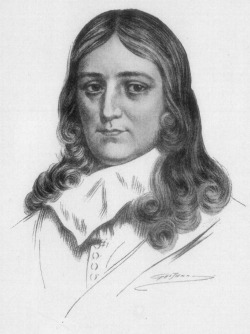Octave
an eight-line stanza. Most commonly, octave refers to the first division of an Italian sonnet.
Sonnet 19
John Milton
When I consider how my light is spent,
Ere half my days, in this dark world and wide,
And that one talent which is death to hide
Lodged with me useless, though my soul more bent
To serve therewith my Maker, and present
My true account, lest He returning chide,
“Doth God exact day-labour, light denied?”
I fondly ask; But patience, to prevent
That murmur, soon replies “God doth not need
Either man’s work or his own gifts. Who best
Bear His mild yoke, they serve Him best. His state
Is kingly: thousands at His bidding speed
And post o’er land and ocean without rest;
They also serve who only stand and wait.”
John Milton’s nineteenth sonnet consists of an octave and a sextet. The octave is the first division of the Italian sonnet, “When I consider…But patience, to prevent”. Milton discussed his blindness in this sonnet, writing about how soon he would be completely blind. Milton would memorize a passage of this poem, and have a close relative visit him every few days and set it to paper. He doesn’t lament his own privation, but insists wholly on the wreck of the heaven-appointed task to which he considered himself called and set apart.

"A good book is the precious lifeblood of a master spirit, embalmed and treasured up on purpose to a life beyond life." ~John Milton
John Milton

Milton was born in London on December 9, 1609 as the son of a wealthy notary. He was educated at St. Paul's School. Milton received a Masters degree from Cambridge University in 1632. In 1638, he undertook a European tour where he met many of the major thinkers of the day, especially in Italy.
On his return to England, Milton became a Puritan, and an opponent of the Catholics and of the Stuarts. He was also an ardent polemicist, a follower of Cromwell, and the latter's foreign language secretary. In 1652 he became completely blind. His first wife died in 1652 and he remarried in 1656.
After the restoration of the Stuarts he suffered considerable persecution. He withdrew from active participation in politics and concentrated on his poetry. Paradise Lost was published in 1667, followed by Paradise Regained and Samson Agonistes in 1671. Among other popular works by Milton are the elegy "Lycidas", Comus , a masque, and the companion pieces "L'Allegro" and "Il Penseroso."
Milton died in London on November 12, 1674.
(http://www.online-literature.com/milton/)
